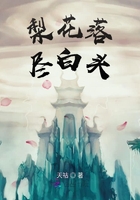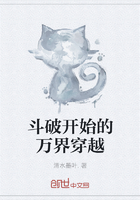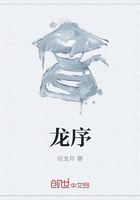All through that terrible night Prince Inga remained hidden in his tree. In the morning he watched the great fleet of boats depart for their own country, carrying his parents and his countrymen with them, as well as everything of value the Island of Pingaree had contained.
Sad, indeed, were the boy's thoughts when the last of the boats had become a mere speck in the distance, but Inga did not dare leave his perch of safety until all of the craft of the invaders had disappeared beyond the horizon. Then he came down, very slowly and carefully, for he was weak from hunger and the long and weary watch, as he had been in the tree for twenty-four hours without food.
The sun shone upon the beautiful green isle as brilliantly as if no ruthless invader had passed and laid it in ruins. The birds still chirped among the trees and the butterflies darted from flower to flower as happily as when the land was filled with a prosperous and contented people.
Inga feared that only he was left of all his nation.
Perhaps he might be obliged to pass his life there alone. He would not starve, for the sea would give him oysters and fish, and the trees fruit; yet the life that confronted him was far from enticing.
The boy's first act was to walk over to where the palace had stood and search the ruins until he found some scraps of food that had been overlooked by the enemy. He sat upon a block of marble and ate of this, and tears filled his eyes as he gazed upon the desolation around him. But Inga tried to bear up bravely, and having satisfied his hunger he walked over to the well, intending to draw a bucket of drinking water.
Fortunately, this well had been overlooked by the invaders and the bucket was still fastened to the chain that wound around a stout wooden windlass. Inga took hold of the crank and began letting the bucket down into the well, when suddenly he was startled by a muffled voice crying out:
"Be careful, up there!"
The sound and the words seemed to indicate that the voice came from the bottom of the well, so Inga looked down. Nothing could be seen, on account of the darkness.
"Who are you?" he shouted.
"It's I -- Rinkitink," came the answer, and the depths of the well echoed: "Tink-i-tink-i-tink!" in a ghostly manner.
"Are you in the well?" asked the boy, greatly surprised.
"Yes, and nearly drowned. I fell in while running from those terrible warriors, and I've been standing in this damp hole ever since, with my head just above the water. It's lucky the well was no deeper, for had my head been under water, instead of above it -- hoo, hoo, hoo, keek, eek! -- under instead of over, you know -- why, then I wouldn't be talking to you now! Ha, hoo, hee!" And the well dismally echoed: "Ha, hoo, hee!" which you must imagine was a laugh half merry and half sad.
"I'm awfully sorry," cried the boy, in answer. "I wonder you have the heart to laugh at all. But how am I to get you out?"
"I've been considering that all night," said Rinkitink, "and I believe the best plan will be for you to let down the bucket to me, and I'll hold fast to it while you wind up the chain and so draw me to the top."
"I will try to do that," replied Inga, and he let the bucket down very carefully until he heard the King call out:
"I've got it! Now pull me up -- slowly, my boy, slowly -- so I won't rub against the rough sides."
Inga began winding up the chain, but King Rinkitink was so fat that he was very heavy and by the time the boy had managed to pull him halfway up the well his strength was gone. He clung to the crank as long as possible, but suddenly it slipped from his grasp and the next minute he heard Rinkitink fall "plump!" into the water again.
"That's too bad!" called Inga, in real distress; "but you were so heavy I couldn't help it."
"Dear me!" gasped the King, from the darkness below, as he spluttered and coughed to get the water out of his mouth. "Why didn't you tell me you were going to let go?"
"I hadn't time," said Inga, sorrowfully.
"Well, I'm not suffering from thirst," declared the King, "for there's enough water inside me to float all the boats of Regos and Coregos or at least it feels that way. But never mind! So long as I'm not actually drowned, what does it matter?"
"What shall we do next?" asked the boy anxiously.
"Call someone to help you," was the reply.
"There is no one on the island but myself," said the boy; "-- excepting you," he added, as an afterthought.
"I'm not on it -- more's the pity! -- but in it," responded Rinkitink. "Are the warriors all gone?"
"Yes," said Inga, "and they have taken my father and mother, and all our people, to be their slaves," he added, trying in vain to repress a sob.
"So -- so!" said Rinkitink softly; and then he paused a moment, as if in thought. Finally he said: "There are worse things than slavery, but I never imagined a well could be one of them. Tell me, Inga, could you let down some food to me? I'm nearly starved, and if you could manage to send me down some food I'd be well fed -- hoo, hoo, heek, keek, eek! -- well fed. Do you see the joke, Inga?"
"Do not ask me to enjoy a joke just now, Your Majesty," begged Inga in a sad voice; "but if you will be patient I will try to find something for you to eat."
He ran back to the ruins of the palace and began searching for bits of food with which to satisfy the hunger of the King, when to his surprise he observed the goat, Bilbil, wandering among the marble blocks.
"What!" cried Inga. "Didn't the warriors get you, either?"
"If they had," calmly replied Bilbil, "I shouldn't be here."
"But how did you escape?" asked the boy.
"Easily enough. I kept my mouth shut and stayed away from the rascals," said the goat. "I knew that the soldiers would not care for a skinny old beast like me, for to the eye of a stranger I seem good for nothing.
Had they known I could talk, and that my head contained more wisdom than a hundred of their own noddles, I might not have escaped so easily."
"Perhaps you are right," said the boy.
"I suppose they got the old man?" carelessly remarked Bilbil.
"What old man?"
"Rinkitink."














